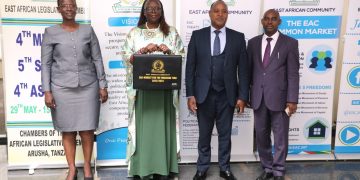East African Community Headquarters, Arusha, Tanzania, 2nd June 2022: The East African Community (EAC) has tabled before the East African Legislative Assembly (EALA) the budget estimates for the 2022/2023 Financial Year totaling US$91,579,215.
Presenting the speech before the Assembly, the Chairperson of the Council of Ministers and Kenya’s Cabinet Secretary for EAC and Regional Development, Hon. Betty C. Maina, said that the budget estimates for the Financial Year 2022/22023 are being presented at a time when the world’s economic recovery from the COVID-19 pandemic is under threat from the rising prices of fuel and other commodities, occasioned by the Russian – Ukrainian conflict.
“Economic growth in the EAC region averaged 5.9 percent in 2021, compared to an average of 2.3 percent in 2020. The strong regional economic growth in 2021 was largely supported by increased removal of COVID-19 related restrictions, public investments and strong performance in the productive sectors,” said Hon. Maina.
The Cabinet Secretary noted that the rising commodity prices, especially fuel and food, are impacting negatively on the welfare of East Africans and the world alike.
“Global economic growth is expected to slow down from 6.1 percent in 2021 to 3.6 percent in 2022. Economic growth in the EAC region is projected to decline from an average of 5.9 percent in 2021 to 5.3 percent in 2022 and 5.7 percent in 2023,” she added.
The 2022/2023 Budget is themed ‘Accelerating Economic Recovery and Enhancing Productive Sectors for Improved Livelihoods.’
Hon. Maina said that the EAC would focus on 10 priority areas, namely: Peace and Security; Private Sector Development and Participation; Economic Integration; Improvement of productivity, Value addition and promotion of regional supply chains; EAC Digitalisation Agenda; Health; Implementation of the roadmap of the EAC Monetary Union, Infrastructure Development, and; Institutional strengthening and transformation.
The 2022/2023 Budget is allocated to the EAC Organs and Institutions as follows: EAC Secretariat – US$45,137,041; East African Legislative Assembly – US$15,086,640; East African Court of Justice – US$3,803,836; Lake Victoria Basin Commission – US$8,289,474; East African Science & Technology Commission – US$1,725,256; East African Kiswahili Commission – US$1,284,219; East African Health Research Commission – US$1,867,665; East African Competition Authority – US$1,011,132; Inter-University Council for East Africa – US$10,566,869, and; Lake Victoria Fisheries Organization – US$2,807,083.
This year’s budget is a dip from the amount of US$91,784,296 approved by the August House for the 2021/2022 Financial Year.
The Minister highlighted the finalization of the review of the Common External Tariff (CET), the elimination of twenty-five Non-Tariff Barriers (NTBs) reported during the year and the harmonization of over 145 standards for the commonly traded goods in over 16 sectors as some of the milestones the EAC had hit in the 2020/2021 financial year.
On the EAC Single Customs Territory, the Cabinet Secretary disclosed that the next financial year would, among other things, focus on the integration of the Democratic Republic of the Congo and the Republic of South Sudan into the Customs Union.
Customs would also focus on: Integrating the Electronic Cargo Tracking Systems along the Transit Corridors; Enhancement of Interconnectivity of systems in key sectors to facilitate information exchange, and; Capacity building for trade particularly small-scale women traders.
On the Monetary Union, the CS informed the House the process of establishing the East African Monetary Institute (EAMI) was initiated in March 2022 with a verification mission to Partner States who had declared interest in hosting the EAMI.
“The 42nd meeting of the Council is expected to consider the report of the Verification Committee and determine the Headquarters of the EAMI, as per Article 7 of the East African Monetary Institute Act, 2019. Other administrative procedures, including the development of the Organizational Structure for the EAMI, have also been initiated. The EAMI is expected to carry out much of the preparatory work for the creation of the East African Monetary Union,” said CS Maina.
On the East African Legislative Assembly (EALA), the CS stated that the term of the 4th Assembly will end on 17th December 2022.
“As expected, the commencement term of the 5th Assembly is planned to take effect soon thereafter. As Council, we shall give the Assembly all the necessary support to inaugurate the new Assembly,” said Hon. Maina.
In the FY 2022/2023, the Assembly will prioritize the enactment of Executive/Council Bills which are under consideration by its Standing Committees.
These Bills are critical for the smooth functioning of the EAC Customs Union such as the EAC Customs Management (Amendment) Bill, 2022 and the EAC Standardization, Accreditation and Conformity Assessment Bill, 2022); for enhancing social and health services to the people of East Africa like the EAC Pharmaceuticals Bill, 2020 and the EAC Sexual Reproductive Health Rights Bill, 2021); the preservation of our culture such as the EAC Cultural Heritage, Bill, 2022; While others are for progressively operationalizing the Monetary Union, which include the EAC Financial Services Commission Bill, 2022 and the EAC Surveillance Compliance and Enforcement Bill, 2022.
“As Council, we are optimistic that the Assembly will enact these Bills before December 2022,” said the Cabinet Secretary.
On the East African Court of Justice, the CS disclosed that after marking its 20th anniversary in November 2021, the Court has in an effort to increase its visibility and bring its services closer to the people, decided to hold its November Sessions in the Partner States on a rotational basis.
“The November sessions shall be preceded by the Annual East African Court of Justice Judicial Symposium.”
The CS said that EACJ’s priority interventions in the FY 2022/2023 will be to increase the number of cases concluded at the earliest possible time; increase Court’s visibility in the Partner States; enhance the skills of the Judges and staff of the Court, for efficient delivery of justice; and enhance collaboration with other Regional and International Courts.









